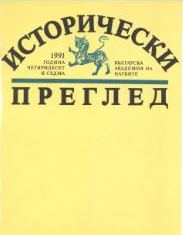Как бе пробит таванът на „стария режим“? (Първа част)
How the Top of the “Old Regime” Was Broken (Part One)
Author(s): Stoycho GrancharovSubject(s): History, History of ideas
Published by: Институт за исторически изследвания - Българска академия на науките
Summary/Abstract: In 1967 the eminent French historian Fernan Bordel asked an essential for the understanding of the historical development of the mankind during the last 5-6 centuries question: “How that order, that complex system of life, that “old regime”, reigning all over the world, became ineffective, broke itself? How it crossed the limits of its possibilities, overcoming the obstacles, it had alone placed? How was its top broken, how could the top be cracked, and why only in use of some privileged in the world?”. The privileged are well-known – West Europe and its civilization product – North America. They are leading and in our contemporary world. So, the an swear of the stated question to a great extent can help to understand the status of our present. The reasons for the anticipating development of the West, Bordel finds most commonly said in one main feature of its civilization and its historical concretization – precisely its ability for selfrenovation, selfdevelopment, borrowing of values – either the way of thinking, or the form of belief or working tools. This capability the French scientist calls receptivity towards the “phenomena of diffusion” and according to him it is “the best touchstone for the life capability and originality of each civilization”. In the suggested essay in a concrete historical plan an attempt is made, the roots of the receptivity towards the “phenomena diffusion“ to be found and their multiformity and contradictory manifestation in the unity of economics, politics, culture and ideology. Increased attention is payed upon the ideology field, as far as the prevailing contributions of the great French thinker are in the sphere of the base economical relations. In the course of the presentation, the views of the French historian are compared and often opposed to onefact and speculative philosophical and historical teachings such as the historical materialism, as well as other considerable attempts for explaining of the essential in the historical development of the mankind.
Journal: Исторически преглед
- Issue Year: 1991
- Issue No: 5
- Page Range: 3-21
- Page Count: 19
- Language: Bulgarian
- Content File-PDF

